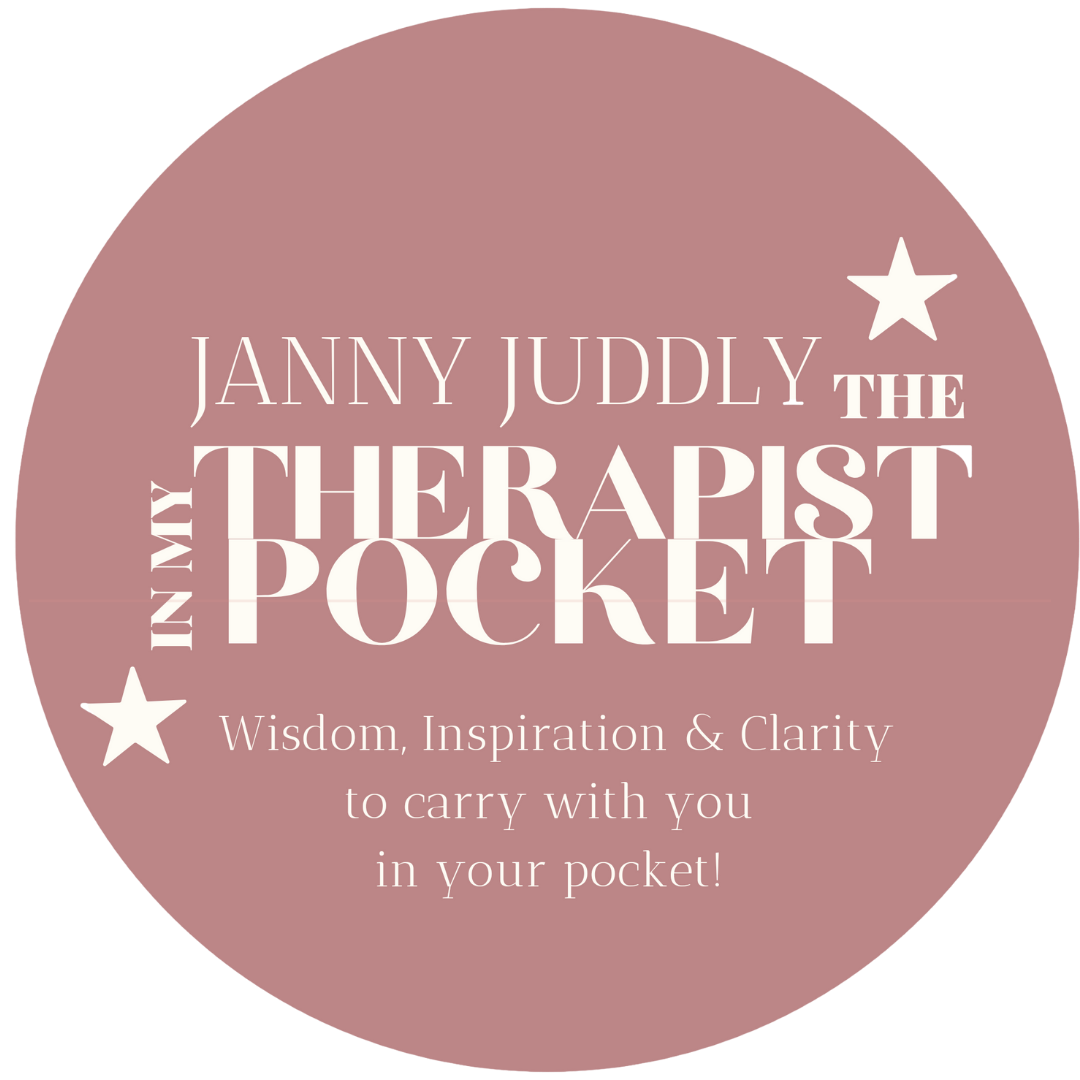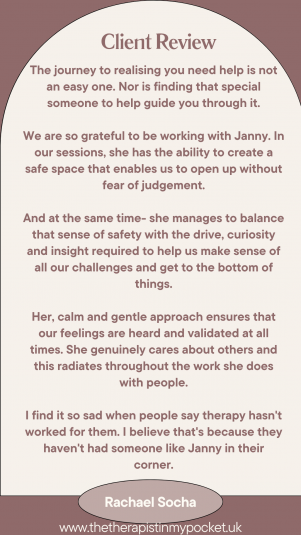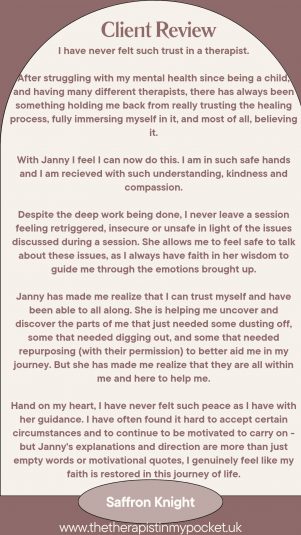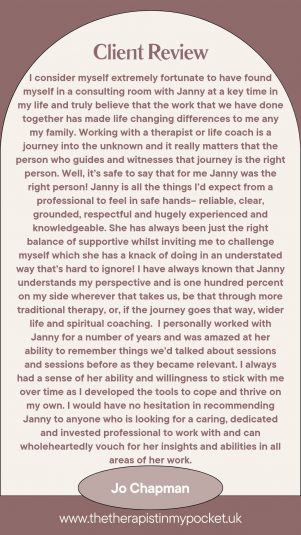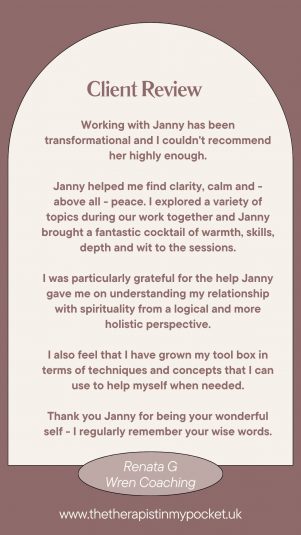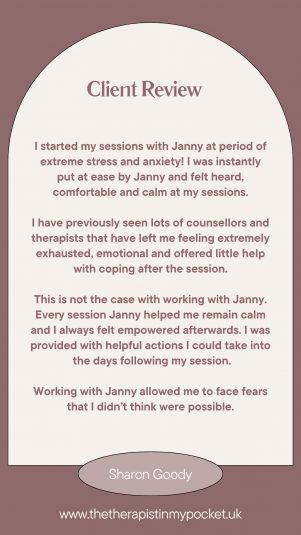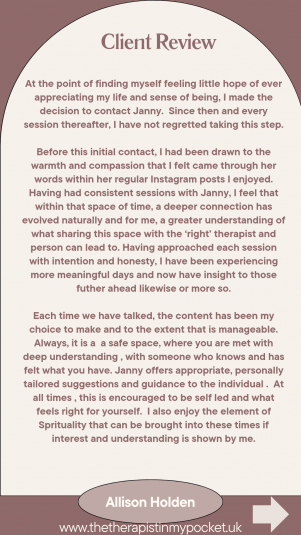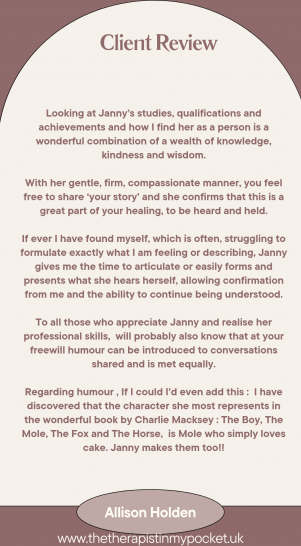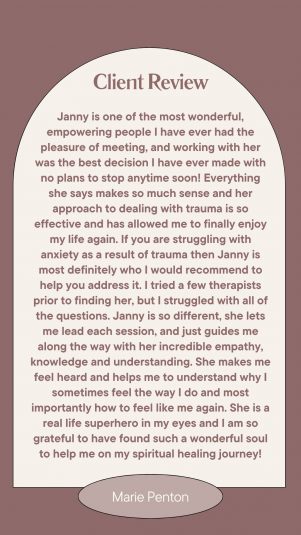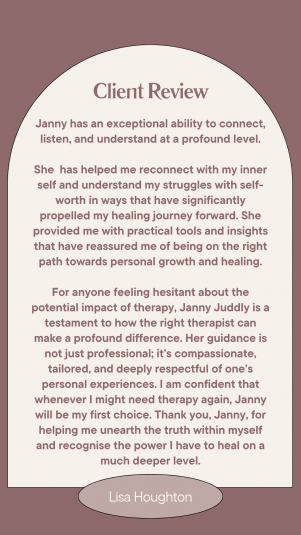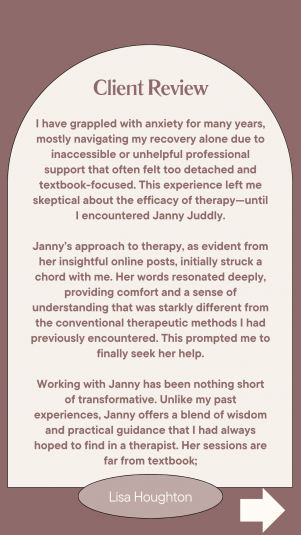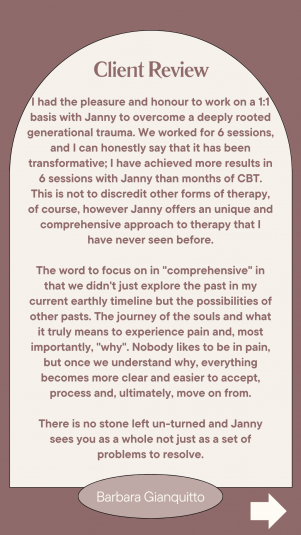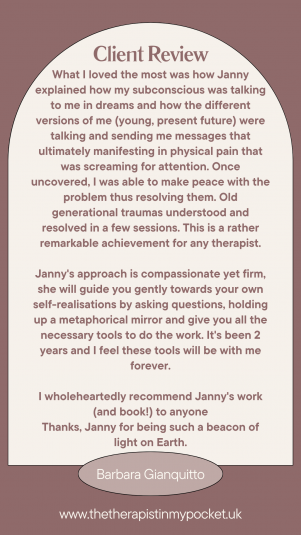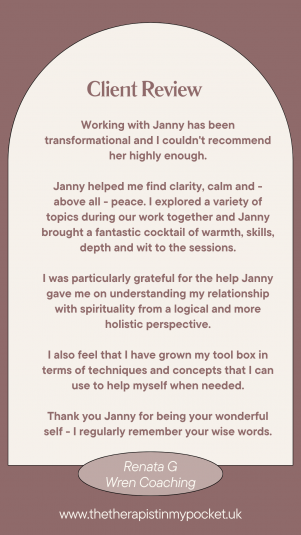
Welcome to
The Therapist In My Pocket
With Janny Juddly
In this busy, sometimes bewildering, often stressful world, where life can so frequently just seem to take over, and where unexpected happenings can knock us off course to the point where we just want it all to stop, take some time out, breathe more slowly, find time to think and a way to get ourselves back on track, I'd like to offer you some space to get back on track and find yourself again.
As a holistic and psychospiritual psychotherapist, I help people who are stuck in pain and fear, and lost in the story of what's happened to them, to heal that pain, overcome that fear, free themselves from that story, and to empower themselves to flourish and thrive.
✨Stuck in the pain of what's happened to you?
✨Reliving a story over and over that you can't escape from?
✨Trying to be one person, but keep on being a different one?
✨Longing to heal but don't know how?
✨As a psychospiritual psychotherapist with over 30 yrs experience, I know how to help you to do exactly that! And I can promise you it feels so good! I'm just a DM away! Isn't it time?
Why you might like to work with me:
Welcome to The Therapist In My Pocket!
Meet Janny
My name is Janny Juddly, and I'm a psychospiritual psychotherapist and holistic practitioner. I have over 35 year's experience of working with individuals, couples, families, children & young people and groups. I have also worked as both a lecturer and supervisor in psychotherapy and counselling, and continue to supervise practitioners both in organisations and private practice.
Based in Shepshed, I have offered holistic psychotherapy, counselling, reiki and other holistic therapies for Loughborough, Ashby-de-la-Zouch, Kegworth, Loughborough and surrounding areas for over 30 years.
Why am I called "The Therapist in my Pocket"?
Well, that arose quite a few years ago, and has stuck ever since. Clients often told me that when they found themselves in difficult situations, they would call to mind what we had talked about in sessions and it would feel as if they had me in their pocket reminding them, or lending them strength and courage.
It was such a lovely thought that clients felt that way that, as I began to write and share more of my thoughts and knowledge and expertise on social media and in podcasts, the name took on a life of its own.
I'm now known as the Therapist in my Pocket all over the world, and I love that I can be that for others. I see this human journey called Life as one in which it helps to have another walk alongside. Not as an expert - although, of-course, it helps that the person keeping us company has plenty of life experience and knowledge to share - but rather as a fellow traveller with wisdom and insight to share, but who also believes in us, in our own resourcefulness and resilience, and our innate ability to heal if given the right conditions.
If that sounds good to you, I'd love to offer you that company on the journey, and to walk alongside you while you find inside you the wisdom and strength and self-belief and self-compassion you need in order to heal.

Our need for space and connection
If ever there was something most of us find ourselves craving at some time or another, it's space for ourselves. At least, that's what so many of my clients tell me when they come and sit down in my therapy room. I reckon most of us have felt this need, at one time or another.
That, and rest.
We live life at such frantic speed most of the time, we eat on the go, we text rather than phone because it's quicker, things often feel chaotic and hurried and like there's no time. We're often hazily aware that we're not really thinking things through, that we're just reacting to life and to others rather than reflecting and responding. We're functioning, but it's hard to enjoy our life or the people in it much of the time.
We live disconnected - from those we love, from those might help, from the world. from joy and fun and any sense of satisfaction or peace or fulfillment.
Most of all, we end up living disconnected from ourselves. Who we are, what we yearn for, how we'd rather be. And how on earth it's come to this!
And that's on a good day. When things are going reasonably well, and we're just about getting by.
Add into the mix something extra - it could be something sudden and unexpected, like illness or a bereavement, a relationship breakdown or redundancy; or it could be something that we've been putting out of our mind for a very long time, maybe something that happened when we were younger that hurt or shamed us. We've been trying to ignore it but suddenly it won't go away any longer.
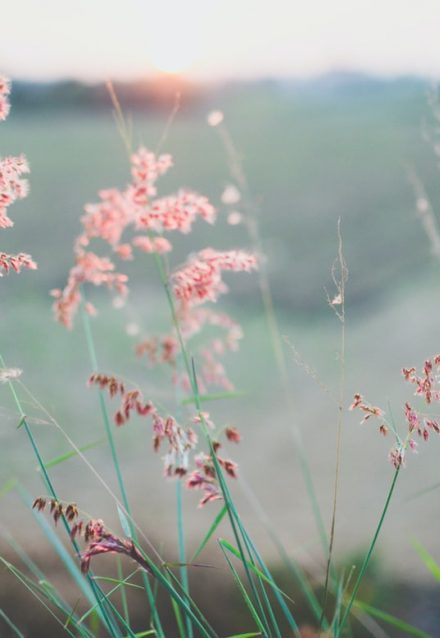

The effects of Trauma
Trauma is a challenging word, isn't it! We often don't feel comfortable applying it to ourselves, or to our experience.
And, of-course, you don't have to. But I think it's helpful to explore that word a little, widen its application a bit.
Current research into trauma would indicate that trauma isn't so much what happens to us. It's more about the help - or lack of it - that we experience at the time.
When someone helps us to process something difficult, we find that we can find ways to manage it; if there's no one to help us - or who knows how to help us - then we can carry the effects of what we've experienced in our body, in our mind, in our relationships, in the way we view ourselves - until that moment when someone offers us their presence and understanding, and helps us feel safe enough to share it.
It could be an old wound or hurt that happened a long time ago. Maybe something that's just happened has brought the memory back up to the surface, and we know we need to deal with it, but don't know how or where to begin. Like the death of a parent, or being bullied, feeling stupid at school, or isolated or lonely.
The trigger could be something current, like finding out we are ill, or something happening that turns our world upside down. Often, old trauma is re-activated by something happening now that brings up an old feeling, experience, memory or dynamic.
It can feel frightening, unbearably sad, bewildering - something we just can't see our way to getting over. Or through.
Sometimes it can be something that's difficult to put into words, or to find a reason for, like a general feeling of unhappiness. Of knowing deep down that all is not well and that we've just been trying to put on a brave face, but really pretending for a very long time. Sometimes for a whole lifetime, to ourselves as well as to other people.
I have over 30 years' experience of helping others to find the courage and strength to stop pretending - to themselves and to others - and to step into a way of being that's liberating and so healing.
Why not reach out and let me help you to:
... to explore your thoughts and feelings
... to get back on your feet again
... to work it out in such a way that you don't look back?...
...Except to say, 'Look how far I've come, and where I am now! I didn't think I had it in me! I didn't think I could ever find myself here. I'm so proud I did it!'

The problem of running away from feelings
Sometimes we just want a break. We want it all to stop. Sometimes that means we start running. Not always intentionally. We run from feelings that are too overwhelming, too confusing, too painful to bear. We're exhausted and drained from it all and we feel a desperate need to be able to be numb for a while.
Sometimes we've even gone as far as creating our own numbness by drinking or gambling or by the way we use food or maybe sex.
Trouble is, it might last for a while, such manufactured numbness. But the feelings always come back. Often in the form of anxiety, as we try to keep pushing down feelings that don't want to be silenced anymore.
And there's an additional problem, which we don't always appreciate at the time. That's this: when we push down 'bad feelings we push down all feelings, 'good and 'bad.'
We end up swinging between feeling nothing, suppressing our feelings, becoming depressed; or our feelings refuse to be pushed away, and keep breaking through so that we experience anxiety and panic.
Either way, the end result doesn't feel good.
What if someone else were to give you some 'space' so you didn't have to run?
What we don't often imagine, however, when we think of 'space', is the idea of someone else giving us space. We tend to be aware of our longing for space, but without being able to see how it could actually help us. Except temporarily.
We don't usually imagine sitting talking with someone who will give us the space to work out what it is we really want to say, exactly what we're feeling, what's troubling or puzzling us, the things we thought we could never say, or be helped to look at.
If we're not used to being given space, it can also be hard to imagine how we might fill it, or use it. You've no idea how many clients reach the end of a session and say something like, 'Well, I didn't think I had anything to say, who would have thought all this was here! I want to come back to this!'
We don't usually imagine that such space could either be possible, or even helpful.
We'd like someone to understand and help, yes. But then we're used to that helping person giving us advice, or telling us what we should do.
However, deep down, if we were to really think about it, most of us don't actually like being told what we should do. It might bring temporary relief, but it still means that someone else did it, not us. And that leaves us worried that next time something happens, we'll be back at square one again, in this same old place, needing someone else to tell us what to do all over again
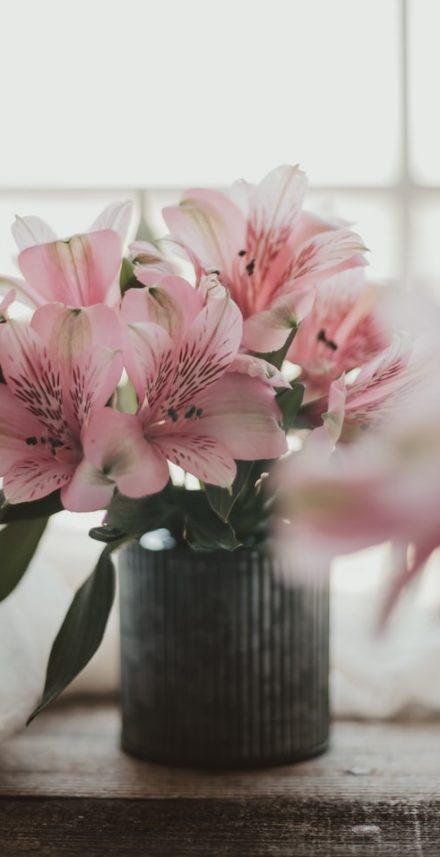

In the long run, that still leaves us running scared, looking over our shoulder or round the corner for the next time. And the next.
However, just supposing that, instead of someone telling us what to do, they would help us to discover what we really need, and want to do for ourselves? To learn how to listen to our own voice instead of depending on theirs?
And supposing that this other person was quietly but absolutely confident that, with their help to learn how to make use of the space, and to learn how to listen to our feelings and our own intuition, our own voice and all we know if only we trusted ourselves, we would tap into what we already knew but had just ignored, or forgotten, or failed to notice?
What if that person would walk beside us for a while, and give us space while we work it out? Knowing and believing that as a team we could do this?
And what if that person would also share their thoughts with us, or make suggestions if we ask for them? What if that person had years of experience and wisdom and skills available when we'd like to make use of it. And suppose that person would be willing to share with us what they know, techniques we might find really useful, and would share valuable insights and give us feedback? And even be quite challenging at times, and offer us their openness and honesty in a respectful and supportive way?
What if they would be willing to hold a safe space for us, without judgement or pressure or demands, while with their active help we work it out. To walk with us for a while, at our pace and in the direction we wanted to go?
How might that be? Could that be the kind of 'space' you might really be looking for? The kind that might just make the difference?
That's exactly the kind I'll offer you. It's what The Therapist In My Pocket is all about.

The difference between 'healing' and 'curing'
If we could choose between being healed and being cured, I wonder which would seem the most desirable? Maybe those two things don't seem any different? Why distinguish them?
However, if we examine them, there are important differences, especially from a holistic point of view. Could it be that for something to be 'cured' somehow suggests that something is made better, taken right away, got rid of so that it never bothers us again?
That might happen now and again in life, that 'magic wand moment.' But maybe it isn't the norm.
Holistically speaking, maybe that's a bit like taking a symptom away without ever taking time to think about where that symptom came from in the first place. Without questioning how our life-style or the experiences we have known and held within our body might have contributed to this symptom from which our mind or body longs for relief?
When we do that, we miss the learning and the wisdom and the changes needed. We simply reach for the relief, but with the intention of never thinking about it again.
In contrast, to heal is to integrate the experience we've been through, to welcome what can help us move forward from it in a way that means we leave the pain or unwanted emotion or associations behind, because we've worked through them with another's help, and feel free to go forward with valuable lessons to take with us.
Healing is transformative, and every part of who we are is changed in the becoming something more. Healing is about growing, expanding, becoming courageous and less fearful because we know we can survive.
A cure, if we're lucky, is an event, but we are largely unchanged by it; healing, in contrast, is a process, a journey, and we come out the other end optimistic and deeply satisfied. And so aware of what we have achieved.
Someone else cures us; healing is something we do, with another's help, for ourselves. And that never leaves us, and we never forget, because we can never not know all that we now know. And that feels amazing!

Cindy's Story
"I had known for a good year that things weren't right. I wasn't sleeping, I wasn't thinking clearly, I had withdrawn from everyone, I felt overwhelmed and stressed all the time. Friends would ask me if I was okay and I would just brush them off by saying I was just tired or had a lot on at work. But really, I knew I was really unhappy. I was fighting back tears a lot of the time, and couldn't see anything good about my life or my future.
Then one night I broke down to a friend, and was amazed when he told me he'd seen a therapist a couple of years ago and that he'd encourage me to go and talk. He gave me Janny's business card, and urged me to make an appointment. He said he could recommend them highly, and that a number of people he knew had been there over the years to see Janny, and that he'd highly recommend her. It really surprised me that I wasn't the only one.
I kept it in my wallet for another 4 months or so, because every now and then things would feel better for a little while and so I would convince myself that I didn't need to go.
But one Sunday evening, late, I went onto her website and sent Janny a message. I still played down how bad things really were, and said I was a bit stressed and needed a few techniques to help me manage it. I knew it was much worse than that, but I felt embarrassed to say it like it really was.
We set up an appointment, and I felt both relieved and scared at the same time.I nearly backed out when I turned into the road as well. I nearly turned the car around and drove off. But I'm so glad I didn't. I'm so glad I knocked on her door.
That night was the turning point. The relief of talking to someone who made it easy to talk and who just seemed to get it was unimaginable. Gradually and very gently Janny helped me to say the things I'd been bottling up. And she had a way of drawing all the different threads together in a way that started to make sense of it all. She picked up everything, and seemed to hold it all and then give it back to me so I could start to hear what I was really saying, and so everything started to feel more manageable.
And it wasn't just stuff about now. And it wasn't that I talked and she just listened. It was a lively two-way conversation, not like some people I'd heard describe where they'd been asked to fill out tick boxes, or where they'd been talking to someone who didn't seem to say much back. She said lots back, and gave shape and meaning to what I said. Stuff now and stuff from the past. And it all linked up, it all started to make sense.
I realised that who we are is the story of what we've known, and therefore of what we've come to expect and believe. And I came to see that who I was now was all about who I'd been, what I'd lived, what I'd known and the sense I'd made of those things. It had never occurred to me that other people in the world might see those things differently, or might not react the way I did. Janny referred to it as the way we 'cut and paste' our own experiences onto everything we come into contact with. I came to see that I would react to certain people in exactly the ways I might once have reacted to other significant people in my life. Like I was replaying the same old stories over and over again without knowing I was doing it.
I learned that feelings and thoughts were different things, and I discovered how the mind affects the body and vice versa. I realised that memory is really powerful, and that sometimes I felt like an adult, but lots of the time I felt like a child. Janny helped me to see that this was when old memories took over, and showed me how to get back into an adult place and feel empowered again.
Together we unravelled how I spent so much of my life pretending, being what other people wanted me to be, trying to do and say what would make people like me, but that this meant I wasn't ever really being myself. In fact, worse still, I realised with a shock that I didn't even know who I was because it had been so long since I'd been able to notice what I really felt or really thought.
Janny talked about something called a 'false self,' a sort of mask we learn to wear and show to the world because that's what we've come to believe the world wants. We wear it to protect ourselves so we don't get hurt or shamed or rejected or make people angry or upset. We become so good at wearing it that eventually we don't even know we're doing it.
But the problem with that mask is that, although it seems to protect us, it actually also hides who we really are, even from ourselves. We don't know what we really feel or think about anything, we don't know what our likes are, our interests are, what we want to do or to be. Everything starts to feel a bit empty and meaningless, like we're just existing and trying hard to meet everyone else's needs. I realised that I had a lot of feelings underneath about all of that.
I had kind of known some of this, but I think I'd been really scared to look at it. I couldn't see how that was ever going to change, and had thought that if I tried to change I would lose everyone.
But Janny helped me to think about that, without any pressure at all to do anything unless and until I was ready. She never pushed, just encouraged and empowered. She helped me believe that my life could be different, and to understand that change happens in small steps, tiny changes, and that we can take our time.
That's the thing about being given space. Janny sort of held a space that I could gradually become myself in, a safe space where I could try things out and think out loud without having to do anything in the outside world until I was ready.
And that gradually turned everything around. I would experiment by maybe saying things slightly differently, or by saying what I wanted sometimes instead of saying I didn't mind. It felt good, and the world didn't end.
As I got braver, I began to risk saying things I never would have thought possible in a million years. But by now I wanted to say them, I didn't want to pretend. Being myself and speaking up with my own voice had become too important for me to just go along with things anymore.
The great thing, also, was that Janny had a huge wealth of techniques and advice about how to speak in a way that meant I would be heard but wouldn't give offence. I realised that even when I might have wanted to say something before I wouldn't have known how to begin. Now I was learning techniques and strategies that really worked, and made me feel like I could do it. I felt skilled and my confidence was growing.
Wherever I wanted to go, Janny would go there with me. In that space, we could talk about anything and prepare for anything. I used to joke that I had her there with me on my shoulder whenever I would tackle something that felt a bit challenging. It was such a good feeling to have that support, and to have that space to go back to and review how things had gone.
I look back sometimes and pinch myself. I never would have thought this could be me. I never would have thought I could have turned my life around like this. Life feels easy and no longer scary or stressful, because I'm no longer pretending. What you see is what you get now, so there's nowhere to fall.
I now carry that business card around with me, and I've passed on the details to a number of friends and colleagues. A close friend who's having a difficult time following the loss of her baby is seeing Janny at this moment, and is finding her calmness and ability to make sense of what's going on so helpful. And a couple I know saw Janny a few months ago and turned their relationship around. I'm totally converted! I think everyone should go and get this kind of help.
If you're like me, putting it off and putting it off, I just want to say don't do that anymore. Make yourself more important than that. Pick up the phone and get in touch. You won't look back."
Why healing matters
Why do we need to 'deal with' things that are troubling us? At all?
Isn't it just as effective - better, even - to 'just get over it?' Put it in a box and fasten the lid down tightly?
To just forget about it? Put it away? Blank it? Ignore it?
Why would we want to open up old wounds? Go over old ground? Talk about things that can't be changed? How does that help? Doesn't that just make it worse? Aren't we just opening up a can of worms?
Isn't that just moaning, or being negative? Won't people just think we're going on about nothing?
And anyway, what's the point if it can't be changed? How is it going to make any difference? Aren't we likely to feel worse rather than better?
These are all important questions, aren't they? Valid points. Why wouldn't we ask ourselves these things? We want to know that something is going to make a difference and that we're going to feel better, and that it will have been worth it, don't we?
Maybe a good place to start is to consider what happens when we don't heal. In particular, what happens when we store memories, feelings and experiences in our mind and body rather than processing them and resolving them so that we can properly let them go.

First and foremost, it's important to understand that feelings don't just disappear because we push them away or try to ignore them. What actually happens is that these are stored and held in our nervous system and in our body. They don't disappear, they just get lodged somewhere else. And the fear centre in our brain - the Amygdala - continues to detect they are there every time something triggers them, however briefly. The more times this happens, the more the Amygdala receives confirmation that these thoughts or feelings are a threat, and so it goes into a state of high alert every time they threaten to surface.
When this happens, we experience anxiety and panic, and the symptoms of 'fight or flight.' These include our heart beating faster, feeling sick, sweating, tension and muscle pain, dizziness, difficulty in concentrating, feeling weak or like we might faint, and a sense of breathlessness or fear that we can't breathe.
The more we try to push something away, the more it keeps coming up to the surface, because our mind is aware that we're caught in a fear cycle, and keeps attempting to help us back towards health by bringing to our attention the very things we're trying to keep put away.
This is often the stage we are at when we realise that we need to seek help. We've tried all the usual ways we usually try to deal with things, and they haven't worked. This problem or issue or memory or worry refuses to go away, and the more we try to squash it down, the worse the symptoms in our body become.
This is why healing matters. It is why we need a space where we can find a way - with another's expert and experienced help - to bring to the surface what is causing us to react in this way, and which will give us no peace until it is dealt with.

How we heal
At the time of initially seeking help, it can often be difficult for us to imagine that we can ever feel any differently to how we feel right now. We've gone round and round inside our head, and we haven't been able to find a way out. It feels like it will be this way forever. Or at least for a very long time. It's hard to imagine feeling different, let alone better.
And then, one day, we know it's done. The old feelings no longer trouble us, the old reactions no longer happen, we are more at peace and comfortable with who we are and where we have been. Gradually and almost imperceptibly, almost without our noticing it, so much inside us has shifted. We see things differently now, we see a bigger picture now, and we have let go of things we thought would never change or ease or let us be.
We look back at how we felt when we began. We feel so different now, we have been on a significant journey and learned so much. About life and ourselves. We have grown into ourselves in ways we couldn't have imagined when we began.
We have found ways to process our experiences rather than suppressing them or running from them, we have trusted another human being with feelings and thoughts we would never have thought we could have trusted someone else to understand or accept without judgement, and we have tasted a strength and degree of resilience within ourselves that leaves us feeling a mixture of pride and relief and gratitude for the space we have used in ways we never knew that we could.
Specifically, we will have faced things that we had once believed we couldn't face, and we will have come to understand things that had once made little or no sense; we will have found words and ways of expressing things we once felt were too overwhelming or complicated or muddled to be able to explain or talk through; we will have learned to be kinder to ourselves, because we will have learned that to understand means that blame has become too simplistic, even irrelevant; and we will have reached important decisions about who we want to be, how we want to be, and we will have developed the tools and the perspective we need to make this happen. We will be relating to people in our life differently, and we may even have made some courageous choices we thought we would never have the strength or clarity to make.
We will know that we can survive challenges and change and ultimately life itself, and we will know that we are ready to to forward with a spring in our step and a lightness throughout our whole being.
We will have used this space, and we will have healed.
Testimonials
'Love your work so much. It's beautiful, empowering and so welcome in the often tick box, medicalised 'help' that only ever made me feel like I wasn't normal. My sessions with you helped me connect so deeply with myself and opened up a new and powerful understanding, for which I'm so grateful. I'm so glad I found you! Thank you for all you share!' Lisa Houghton@simplyanxious
“Let nothing be more important than to heal, for when one heals we all heal.”
Janny Juddly
"You Can Remember Who You Were Before Life Made You Forget " Welbeck Publishing 2022
Transform your pain
Pain and suffering are two completely different things. Negotiating one leads to growth and resilience, the other keeps us stuck in an endless cycle...
Reframe your story
What we tell ourselves about what has happened makes all the difference to how we handle it. We can learn to choose what is most helpful for our own peace of mind...
Empower your life
When we take control by living intentionally and managing our experiences differently, our life becomes transformed and empowered...
Get in touch with Janny
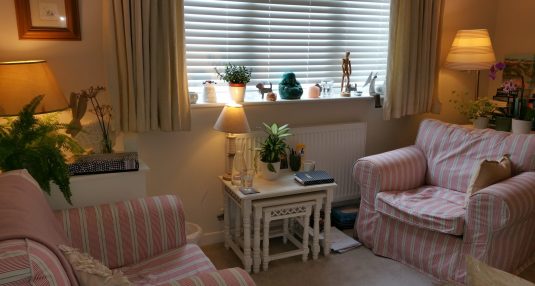
For more information, or to book an initial appointment, fill out the contact form or phone/text on +447757 706426
The Therapist In My Pocket
Holistic Psychotherapy ,Counselling and Reiki for Shepshed, Ashby, Kegworth, Loughborough. Currently online worldwide.
Just off Junction 23 of the M1.
